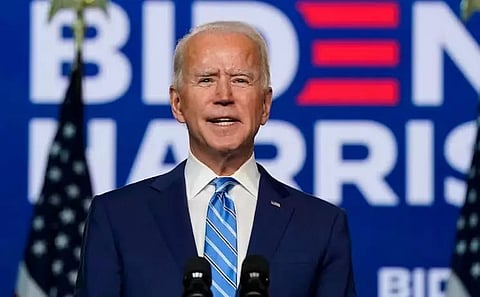
- Home
- Live Blog
- Breaking News
- Top Headlines
- Cities
- NE News
- Sentinel Media
- Sports
- Education
- Jobs

The election of Democrat candidate Joe Biden as the 47th US President is not only one of the biggest political events of an otherwise difficult year caught in the worst-ever pandemic that has hit the world in known history, but is also an event that will contribute immensely towards shaping global politics in the next few years. A former Vice President, Biden (77) has already declared that he can build on the Obama legacy and unite the US in a challenging time. Six-term senator from Delaware since his first election in 1972, Biden, who has served in public life for around a half-century, has emphasized his government experience, in the process seeking to cast himself as a steady, seasoned hand in a dangerous and uncertain world. And as the Covid-19 crisis unfolded, he looked for ways to help voters picture him as commander-in-chief, formulating recommendations rooted in advice from health care and economics experts.
Biden had served as vice-president in the Barack Obama administration during the passage of the Affordable Care Act, and health care remains a top priority for him. As a former chairman of the Senate Foreign Relations Committee, he has always spoken passionately about asserting and defending America's role as a leader on the global stage. Biden's election to the top office in the US also means a lot for India, especially in the context of restrictions on visas to Indians that the outgoing President had imposed despite having been overtly praised and pampered by Prime Minister Narendra Modi. First and foremost, it has already made clear that the new President will work towards providing a road-map to American citizenship to nearly eleven million undocumented immigrants, which includes about five lakh from India.
It is a fact that the huge Indian-American population had overwhelmingly voted for Biden in the backdrop of Trump's stand on visa, and Biden had, much before becoming Vice President in the Barack Obama administration, advocated a stronger relationship with India. He had played an important role, both as chairman of the Senate Foreign Relations Committee and later as Vice President, in systematically deepening the US's strategic engagement with India. In fact, in 2006, three years before he became the Vice-President of the US, Biden had announced his vision for the future of US-India relations by stating that his dream was that in 2020, the two closest nations in the world would be India and the United States. It is interesting to note that then (in 2006), as a Senator Obama was initially hesitant to support the Indo-US nuclear deal. It was however Biden who had led the charge and worked with both Democrats and Republicans, to approve the nuclear deal in the US Congress in 2008. Biden in fact was one of the key advocates of strengthening the Indo-US partnership, especially in the strategic areas. During that time, the US officially declared its support for India's membership in a reformed and expanded United Nations Security Council. This had been a key demand of successive Indian governments, which was fulfilled by the US during Biden's term as Vice President. It was in August 2016, towards the fag end of Obama Presidential term, that the two countries had signed the strategic Logistics Exchange Memorandum of Agreement (LEMOA), the first of the three "foundational pacts" for deeper military cooperation.
This agreement allows the militaries of the two countries to replenish from each other's bases, and access supplies, spare parts and services from each other's land facilities, air bases, and ports, which can then be reimbursed. LEMOA in fact is hugely useful for India-US Navy-to-Navy cooperation, since the two countries have been closely cooperating closely in the Indo-Pacific with China being common in view of both. But what view Biden adopts towards the India-China relationship is yet to become clear. While the Trump administration was highly vocal in India's support in the last six months of the border-stand-off with China, New Delhi will definitely look forward towards continuation of the same US stand by Biden. But then, one will have to probably wait and watch whether Biden will follow the same path or not, but then there could be nuancing of the language and the rhetoric from US officials. But then, his campaign document had clearly stated that once voted to power, Biden will also work with India to support a rules-based and stable Indo-Pacific region in which no country, including China, is able to threaten its neighbours with impunity. Every Indian, at this moment however hopes that Biden will bring the US and India closer than before. This optimism emanates from the fact that Biden understands the issues impacting India – cross-border terrorism, issues related to Indo-Pacific region with China -and supports the rise of India.